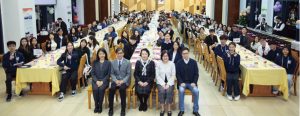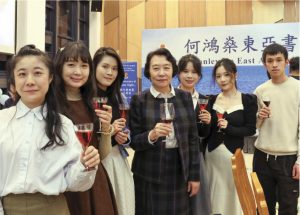On a February evening, Stanley Ho East Asia College (SHEAC) of the University of Macau (UM) kicked off its 15th anniversary celebrations. The first major event was ‘Alumni Night’, a gala dinner that brought together 250 students, faculty, and alumni. As photos and videos flashed across screens in the venue, SHEAC members were transported back to 2010, the year in which the college was established. Under the leadership of Founding Master Prof Iu Vai Pan, the college has grown steadily through a variety of educational initiatives and the efforts of students and faculty, laying a solid foundation for liberal arts education. Today, its core mission remains clear: to consistently enhance the college’s offerings and provide an even more enriching environment in which students may grow and thrive.
Laying a Foundation for Liberal Arts Education
The gala dinner was more than just a celebration—it was a ‘homecoming’ event for SHEAC alumni, allowing them to reminisce about their cherished UM memories. For current students, it was an opportunity to connect with alumni. Throughout the evening, everyone shared stories about the college while enjoying delicious food, and expressed their gratitude to Founding Master Prof Iu Vai Pan for his immense contributions to the college over the past 14 years.
Under Prof Iu’s leadership, SHEAC has remained committed to promoting whole-person development by offering diverse educational initiatives that allow students to explore their passions. Sports enthusiasts can hone their athletic skills and represent the college in competitions by joining college cheerleading, football, or basketball teams. This year, SHEAC won the CICA (Committee on Inter-College Affairs) Master’s Cup Overall Championship organised by the university again, a testament to the hard work and dedication of the students. Meanwhile, those with a love of reading and intellectual exchange can join the reading groups for in-depth discussions, or take part in the ‘Justice Workshop Series’ to debate ideas with peers.
Guiding Students to Achieve the Unity of Knowledge and Action
In August of last year, Prof Luo Qian assumed her role as SHEAC’s new college master. Building on Prof Iu’s legacy, the management team has continued to improve various aspects of the college, while further developing the college into the students’ ‘second home’. The team aims to transform the college into a platform where students can put their knowledge into practice and achieve the unity of knowledge and action.
To cultivate students’ attachment to the college, the management team started with the fundamentals—enhancing the living environment. This academic year marked the debut of the ‘Clean Room Challenge’, which attracted over 150 students and greatly improved the hygiene and environmental conditions of the college. To strengthen the sense of community among SHEAC members, the college organised the ‘Birthday Meal Gathering’ and distributed birthday meal vouchers to students. More than 250 students and faculty attended the gathering and enjoyed meals together in a warm and collegial atmosphere.
By highlighting the concept of ‘home’, SHEAC aims to make itself both a welcoming haven and a springboard for growth—a place where students can focus on academic growth and competency development in a supportive and vibrant community, while gaining the confidence to pursue their ambitions. Recognising that the transition from university life to the ‘real world’ is not easy, the college has launched three initiatives to guide students to define their aspirations and accomplish their goals.
Progressing Together Through Different Initiatives
This academic year, SHEAC has placed greater emphasis on fostering academic excellence among students through the launch of the SHEAC Tutorial Programme. This initiative encourages high-achieving students to study with peers and mentor those who need support. As the ‘Record on the Subject of Education’ chapter of the Book of Rites states: ‘Through learning, one discovers their limitations; through teaching, one understands the true challenges of learning.’ We believe that ‘to teach is to learn twice’—through mentoring others, students not only identify gaps in their knowledge but also deepen their mastery of learning, thus turning information into lasting wisdom that will serve them beyond graduation.
Apart from acquiring knowledge, integrating knowledge with practice is of paramount importance. SHEAC prioritises experiential learning. Take environmental education for example: in March and April this year, the college organised a series of Earth Day activities, including food waste and cardboard recycling (which gave students insight into the lives of local families at the grassroots level), beach cleanups, and upgrading the college’s recycling station. Through these activities, students not only understood how reducing waste and carbon emissions align with the country’s environmental policies and global sustainable development goals, but also experienced first-hand how effective eco-friendly initiatives—and the community organisations driving them—can amplify individual impact into collective change.
In addition, the college has strengthened its career planning support. This includes hosting several lunch meetups and tea sessions to provide further studies consultation, and taking students on study tours to the Guangdong-Hong Kong-Macao Greater Bay Area and Beijing to visit leading universities, enterprises, and innovation centres. These visits and exchange activities have provided students with direct exposure to the latest developments in mainland China and its market, enabling them to define their roles in national development and confidently prepare for the future.
Empowering Students to Sail Towards Their Dreams
SHEAC’s 15th anniversary marks the beginning of a new chapter of its development. The college will remain committed to creating a warm home for students and providing more comprehensive career guidance so that they can chart their career paths. Through various educational initiatives, the college will continue to sharpen students’ academic skills and core competencies, while transforming itself into a platform for practical learning. We hope to empower students to translate knowledge into tangible skills through diverse experiences, preparing them for a promising future.
About the author(s)
Luo Qian is the college master of Stanley Ho East Asia College (SHEAC) and a full professor in the Department of Biomedical Sciences of the Faculty of Health Sciences at the University of Macau (UM). Before joining SHEAC, she held the position of head of the Department of Biomedical Sciences at UM. A graduate of Peking University (BSc and MSc) and the University of British Columbia (PhD), Prof Luo has taught at several top universities worldwide, including Nanyang Technological University in Singapore and the Hong Kong University of Science and Technology.
Chan U Wai is a resident fellow of Stanley Ho East Asia College and holds a PhD in Sociology from the University of Macau. Born and raised in Macao, Dr Chan has over 15 years’ experience in teaching and community service. He has previously worked for the Macao SAR Government and international poverty alleviation organisations.
Text & Photo: Luo Qian, Chan U Wai
Source: UMagazine ISSUE 31
RC Development is a contribution column. The views expressed are solely those of the author(s).
UM launched its residential college (RC) system in 2010 to create a multicultural and multidisciplinary learning platform for knowledge integration. RC education aims to cultivate seven competencies of students, namely responsible citizenship, global competitiveness, knowledge integration, teamwork and collaboration, service and leadership, cultural engagement, and healthy lifestyle.
Website of the Residential College System:https://rc.um.edu.mo/

College Master Prof Luo Qian, Founding Master Prof Iu Vai Pan and over 250 students, faculty, and alumni attend SHEAC’s anniversary kick-off ceremony and ‘Alumni Night’.

College Master Prof Luo Qian toasts with students, faculty, and alumni to celebrate the anniversary.

Students and professors share the latest news and insights on further education and employment during further studies consultation lunch meetups hosted by SHEAC

SHEAC actively supports environmental and educational initiatives such as the food waste recycling scheme, where students get involved in and support environmental projects

